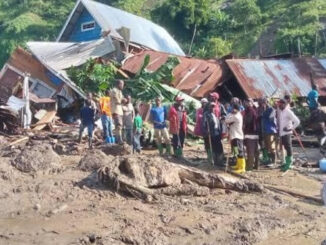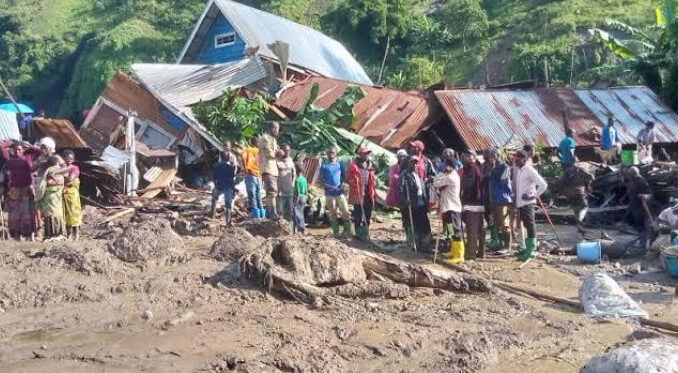Before Malcolm X went to Africa, he was a Black nationalist and member of the Nation of Islam. By the time he left, he had become a Pan-Africanist, fighting an anti-imperialist struggle. African Stream tells the story of Malcolm X’s political transformation that led to his assassination a few months after his return.
Related Articles
Related Articles

Imperialist Militarism and the African Crisis

The following address was delivered in part at a webinar sponsored by the Black Alliance for Peace (BAP) on October 1. The event was held under the theme: “Colonialism, Compradors & The Militarized Crisis of Capitalism in Africa.” This program began an International Month of Action Against AFRICOM. Other panelists were Chris Matlhako, South African Peace Initiative; Ezra Otieno, Revolutionary Socialist League Central Committee (Kenya); and Jamila Osman, Resist US-Led War. The webinar was moderated by Salome Ayuak, BAP Africa Team.
This webinar comes at a critical period in world history where the unfolding of a shifting balance of forces between the western industrialized states and the overwhelmingly world majority of the Global South has created social and political tensions which are being manifested in numerous ways on the international scene.
There is the upcoming COP27 United Nations Climate Conference in Sharm-el-Sheikh, Egypt during November once again providing a forum for the ever-intensifying debates over the necessity of addressing problems of atmospheric and land pollution which has resulted in extreme weather events impacting the supply of water, food and quality housing for several billion people throughout the world.
The COVID-19 pandemic beginning in early 2020, worsened the already unequal distribution of economic resources in both the developing and western capitalist countries. Workplace closures, the lack of adequate healthcare personnel and the failure of the United States to act rapidly early on in the pandemic, has had a devastating impact on the peoples of various geopolitical regions.
Even in the United States, the largest capitalist economy in the world, millions of workers were idled or forced to shift to a new employment paradigm. Hundreds of thousands of small and medium-sized enterprises were forced to go out of operation due to a lack of demand as well as disruptions in the availability of employees.
In the United States, well over $2 trillion in capital infusions in 2020-2021 were interjected into the national economy in order to stave off an economic depression on the scale of the period between 1929-1941. Enormous grants, loans and other incentives were awarded to corporations while extended unemployment benefits and stimulus checks were sent to workers.
Despite all of these measures by the United States and other western capitalist governments aimed at stabilizing their societies, much uncertainty remains due to the advent of an inflationary spiral reflected in the rise of transportation, housing, food and other commodity prices. The disruptions in supply chains related to industrial parts, computer chips, tools and building materials has created further pressure on pricing for products and services.
Currently the financial markets in the United States and in Western Europe are experiencing tremendous losses prompting fears of an even deepening recession. A recession in the United States is defined by two consecutive quarters of negative growth. This has already occurred during 2022 although the term “technical recession” is never used by the current administration of President Joe Biden.
The U.S. central bank, known as the Federal Reserve, in reflecting the desires of finance capital, fears inflation far more than worsening poverty. Federal Reserve Chairman Jerome Powell has raised interest rates charged to borrowers in the hope that the rise in prices will cease. However, the inflation persists at a rate which is even troublesome to major capitalist investors.
In the United States, the policy decisions of the Biden administration have not challenged the role of the banks, energy firms and agribusiness interests in fueling inflation. There are no plans for the implementation of price controls nor the mass distribution of government surplus food stuffs which could lower prices for energy and agricultural products. The administration has periodically “warned” oil companies about taking advantage of the extreme weather events, such as Hurricane Ian, to raise prices even higher, yet the overall strategy of the Biden White House is to largely ignore the burgeoning economic crisis and the impoverishment of working and oppressed peoples in lieu of the upcoming midterm congressional and gubernatorial elections in early November.
However, the results of recent opinion polls illustrate discontent with the administration among the U.S. electorate. Biden’s approval rating has fallen to a range of 39 percent to 41 percent. Most voters, when asked, expressed concerns about the economy while losing faith in the ability of the administration to effectively address the current problems of rising prices, supply shortages, the threat of job losses and homelessness.
Despite the administration propaganda related to the proxy war in Ukraine, there is a direct correlation between military spending and inflation. Tens of billions of dollars are being sent to the NATO client regime in Kiev amid the declining prospects for economic stability in the United States.
The current militarist approaches of successive U.S. administrations should not be a surprise to the anti-imperialist and antiwar constituencies both domestically and worldwide. Unfortunately, there are elements within the peace and social justice movements, for various reasons, have bought into the notions that the major source of instability internationally resides outside of the White House, Pentagon and Wall Street.
Placing demands upon the Russian Federation or any other adversary of the United States while at the same time not holding the administration in Washington and the bankers on Wall Street responsible for the crises of climate change, economic recessions, food deficits and the overall problems of governance within the imperialist states themselves, in effect nullifies any meaningful acts of solidarity with the Global South. As people living inside the capitalist-imperialist citadel of unipolarity dogmatism, it is essential that those who advocate for the ending of war and for a just world speak clearly in regard to the actual source of the instability within the existing world system.
Origins of Imperialist Militarism: The Atlantic Slave Trade and Colonialism
Western corporate and government media are inherently ahistorical in their approach to international affairs. This is quite evident in the coverage of the racial situation in the United States where African Americans and other oppressed peoples are subjected to disproportionate rates of impoverishment, police and racist vigilante violence, incarceration and victimization from environmental degradation.
During the era of the Atlantic slave trade, African people were turned into a source of enrichment through super-exploitation and national oppression based upon racial characteristics. From the early-to-mid 15th century until the latter years of the 19th century, millions of Africans were trafficked into an economic system which only benefitted the colonial rulers. As has been documented in the past, the origins of the major industries within the world capitalist system such as shipping, commerce, banking, manufacturing, criminal justice, etc., were spawned by the profits and military prowess refined during the feudal, mercantilist and incipient capitalist periods of economic history.
African enslavement and colonial occupation were never voluntary processes. These economic systems which provided the basis for the rise of industrial and monopoly capitalism were born in the military assaults and defeats of the African and other peoples of the Asia-Pacific and the Western Hemisphere. The interventions of European enslavers and colonialists disrupted traditional societies, city-states and nation-states. These exploitative and destructive patterns could have never been achieved without the maximum utilization of European military forces.
One source on the military aspect of the Atlantic slave trade noted that: “Millions of Africans were captured and sent not only to America, but to different locations around the world as slaves. Wars also tended to break out on the continent between groups of people, and it became especially contentious when various African groups began conducting raids to capture and sell people for a profit. In America, the price of this trade relationship was paid by the Native Americans, as diseases spread throughout their tribes. With the influx of foreign peoples to the country, different bacteria were brought in, much of which the Native Americans’ bodies could not fight off. The plantation economy also developed as a result of the institution of slavery. Furthermore, a strict social hierarchy went into effect, pitting races and groups of people against one another. Europeans, mixed people, natives, and the enslaved all suddenly pertained to a specific rank in society. Europe derived great wealth from the Triangle of Trade and saw a diffusion of not only European cultural customs, but of people as well. They were known to have spread weapons across the regions, especially to their trade partners on the African continent.” (https://www.studentsofhistory.com/the-triangle-of-trade)
Resistance to enslavement and colonialism took place over the centuries in various territories which were occupied by the Europeans. There were the wars fought by the people of Dahomey against France; the Maji Maji revolt of the people of Tanzania against colonial Germany during the early 20th century; people in Angola under their Queen Ann Zinga fought to liberate people from Portuguese colonialism; among many other instances. The colonial occupation of Africa and the enforcement of legalized institutional racism and segregation in numerous territories on the continent and in the Western Hemisphere were created and perpetuated through military force.
Consequently, the national liberation movements and revolutions were a continuation of this process of resistance. These historical developments were not peculiar to African people as all geo-political regions and territories witnessed revolts against exploitation, oppression and political repression by the colonizing forces.
Nonetheless, in the post-colonial period the threat of imperialist militarism has not receded on the African continent and other areas of the world. Since the consolidation of U.S. hegemony within the capitalist world after 1945, numerous wars of occupation and genocide have been waged by Washington.
In southeast Asia during the 1960s and early 1970s, millions were killed in the failed attempt to defeat the national liberation movements in Vietnam, Cambodia and Laos. Revolutionary wars against colonialism in Africa also resulted in the deaths and displacement of millions between the 1950s to the 1990s.
Therefore, by viewing the contemporary situation in Africa and around the world through an historical lens illustrating the impact of the Atlantic slave trade and colonial conquest, today’s struggles against exploitation and oppression become clearer. The rise of a multipolar world system is a threat to the hegemony of the United States, United Kingdom and the European Union (EU).
The Russian Federation has refused to cooperate with the expansion of the North Atlantic Treaty Organization (NATO) to the point of this military alliance maintaining bases bordering its country. Since the Russian special military operation in Ukraine beginning on February 24, NATO has extended its tentacles to Sweden and Finland. On September 30, the same day in which Moscow announced the merging of the Donbass and Lugansk provinces into the Russian Federation, U.S.-backed Ukrainian President Volodymyr Zelensky made a formal request to join NATO.
Washington has been pressuring the AU member-states to provide political support for its efforts to eliminate Russian influence in Ukraine. A Russia-Africa Summit is scheduled to convene in Ethiopia in November and December. Repeatedly these attempts by the Biden administration have been met with rejection.
On a grassroots level there have been numerous reports of pro-Russian demonstrations in AU states such as Mali and Ethiopia. There are historical and contemporary reasons for African solidarity with Russia. During the period of the Soviet Union, Moscow maintained a diplomatic posture of being in solidarity with independence movements and post-colonial states pursuing non-capitalist and socialist oriented development programs. In the post-Soviet era, particularly under the leadership of President Vladimir Putin, Moscow has enhanced its trade with various AU member-states along with Ukraine.
These realities have been highlighted in recent months with the current food deficits impacting East Africa and other regions. Russia and Ukraine supply in many cases between 50 percent to 90 percent of grain, maize and other agricultural imports. Agricultural inputs such as fertilizer are imported as well from Russia and Ukraine.
A joint meeting several months ago involving President Putin, AU Commission Chair Moussa Faki Mahamat and the Chairman, Senegalese President Macky Sall, in Sochi, the framework for the opening of a humanitarian corridor to facilitate trade amid the escalating war in Ukraine was proposed. Although this plan was later facilitated by Turkish President Recep Tayyip Erdogan, the food deficits have become acute in the Horn of Africa. A combination of drought, internal conflict stoked by western military interference along with economic distress engendered by inflation and burgeoning national debt has endangered millions throughout the East Africa region.
The post-pandemic economic situation cannot be properly addressed while the White House continues to ship arms to Ukraine in their desperate attempt to continue the war. Biden and Secretary of Defense Lloyd Austin stated openly that the foreign policy objectives of Washington are to weaken and remove the Russian government under President Putin.
The position of the AU in regard to the Ukraine war emphasizes the necessity of finding a diplomatic solution to the protracted dispute. This cannot be done as long as the Biden administration views as its principal foreign policy objective the forced removal of strategic competitors out of office from Moscow to Beijing.
It does not serve the interests of African working people, farmers and youth to become embroiled in a renewed Cold War instigated by the NATO countries at the aegis of the U.S. government and ruling class. At present, the advent of multipolarity as an approach to foreign relations will continue to heighten the paranoia and hostility of the U.S. ruling class and state government.
Nevertheless, the African people and other nonwestern nations around the world must stand firm in their convictions which diverge from imperialist interests. This attitude was reflected in discussions between South African President Cyril Ramaphosa during his visit to Washington, D.C. in mid-September. The same thrust was articulated by numerous African presidents and ministerial officials at the debates surrounding the United Nations General Assembly 77th Session held in New York City.
In a Foreign Policy article analyzing the visit of Ramaphosa to Washington for talks with Biden, Vice President Kamala Harris and Secretary of State Antony Blinken, the report emphasizes: “The continent’s importance was highlighted after the United Nations voted to condemn Russian aggression, in which half of the abstentions came from African countries. Having been long neglected in U.S. foreign policy, most African countries are now largely aligned with China in their political and economic partnerships. As a result, Africa has played a major role in furthering China’s and Russia’s goal of weakening the United States as the dominant great power. South Africa’s position is important as the only African member of the G-20. Other African nations have followed its lead in refusing to bow to Western pressure on Russia. As expected, Ramaphosa raised objections to a draft U.S. bill that would sanction Africans doing business with Russian entities that are under U.S. sanctions. The bill, called the Countering Malign Russian Activities in Africa Act, would monitor African governments’ dealings with Russia and has been called ‘Cold War-esque’ as well as described as ‘offensive’ by South African Foreign Minister Naledi Pandor. In Washington, Ramaphosa said Africans should not be punished for their historic nonaligned position. ‘We should not be told by anyone who we can associate with,’ he said—a position that has been popular across Africa, Asia, and Latin America, as Shivshankar Menon noted in FP in July, even if the ideology may not have much to offer in this day and age, as C. Raja Mohan argued recently.” (https://foreignpolicy.com/2022/09/21/ramaphosa-biden-meeting-south-africa-neutrality-climate/)
This intrusive neo-colonial legislation labeled “countering Russia’s malign influence in Africa” is designed to bolster the already existing military presence of Pentagon troops and intelligence officials on the continent. Such a bill if passed would be tantamount to imposing a Cuba-like blockade on the AU member-states.
The Failure of the U.S. Africa Command (AFRICOM): Greater Instability and Economic Distress
After 14 years, the AFRICOM project which was announced in 2007 by the administration of President George W. Bush, Jr. and became operational in 2008, has been a disaster for the AU member-states whether they have participated or not with this entity. Initially, the African states rejected the stationing of the AFRICOM headquarters on the continent.
Later after a reframing of the AFRICOM mission by the Pentagon, where the purpose was to assist African states by strengthening military cooperation and therefore enhancing security, numerous governments allowed the escalation of the presence of U.S. forces. In the Horn of Africa, the French military base at Camp Lemonnier, became the major outpost for Pentagon troops on the continent.
According to the AFRICOM website: “In response to our expanding partnerships and interests in Africa, the United States established U.S. Africa Command in 2007. For the past 14 years, U.S. Africa Command has worked with African partners for a secure, stable and prosperous Africa. The creation of U.S. Africa Command has advanced this vision through a whole-of-government, partner-centric lens by building partner capacity, disrupting violent extremists, and responding to crises. Through consistent engagement, we strengthen our partnerships and assure our allies. Only together can we realize security goals vital for global interests and free trade. Allies and partners are critical in realizing our shared vision while enabling contingency operations, maintaining superiority over competitors, monitoring and disrupting violent extremist organizations, and protecting U.S. interests.” (https://www.africom.mil/about-the-command/history-of-us-africa-command)
However, in reality the security situation in Africa has worsened since the creation of AFRICOM and the deployment of thousands of U.S. troops on the continent. These military forces have constructed drone stations and makeshift bases while engaging in purported trainings of local military units along with engaging in what is described as counter-insurgency operations.
By 2011, AFRICOM was prepared for a large-scale military operation on the continent resulting in regime change and the destruction of population groups. In Libya, beginning in February of 2011, a rebel insurgency was trained and turned loose in the northern city of Benghazi with the aim of overthrowing the government of Col. Muammar Gaddafi.
After the defeat of the Central Intelligence Agency (CIA)-sponsored rebels in several regions of Libya, the U.S. went to the United Nations Security Council where they engineered the passage of resolutions 1970 and 1973 as a cover for the blanket bombing of the oil-rich North African state, then the most prosperous of the AU member-states. On March 19, the bombing of Libya began by the U.S. Air Force accompanied by NATO and allied units.
The result of the war which lasted for nine months killed tens of thousands of Libyans, Africans from other states working in the country and guests from other geopolitical regions. With the installation of a puppet regime in Tripoli after the murder of Gaddafi in October 2011, the conditions in Libya only deteriorated further.
Since 2011, the situation inside the country has not stabilized. The Libyan counter-revolution was the first major combat operation of AFRICOM. The administration of President Barack Obama and his Secretary of State Hillary Clinton championed the war as a victory for “democracy.” In reality, the instability within Libya spread throughout other neighboring states in North and West Africa.
In Mali just one year later in 2012, several insurgent groups began attacks on government institutions and civilian populations in the north and central regions of the country. President Amadou Toumani Toure, a former paratrooper in the Malian military, who had staged a coup in 1991, later changed his military uniform for civilian clothes and won the presidency of the country.
One report from National Public Radio (NPR) in March 2012 said of the-then situation: “’The Tuareg have been making demands for ages,’ says Houngnikpo, who studies civil-military relations at the Africa Center for Strategic Studies in Washington. ‘This is the first time they have posed such a dangerous military threat.’ The army mutineers who seized control of Mali’s government say they have been taking heavy casualties in the recent fight against the Tuareg rebels, because Toure never provided them with adequate weapons or resources.
Mali has also been fighting an offshoot of al-Qaida, which calls itself the Al-Qaida Organization in the Islamic Maghreb, designated as a terrorist group by the U.S. State Department. The coup is a worrisome development for West African analysts such as Jennifer Cooke, head of the Africa Program at the Center for Strategic and International Studies. Cooke says the coup is ‘a major setback to Mali’s political development,’ especially disturbing after the country had won a reputation for the growth of its democratic institutions and economic reforms. Cooke says the disruption will hamper the fight against the Tuareg rebels. And on Friday, word came that the rebels had advanced southward and occupied a strategic government military camp.” (https://www.npr.org/2012/03/23/149223151/malis-coup-a-setback-for-a-young-african-democracy)
Over the last decade there have been another two military coups in Mali. The leaders of these putsches were all trained within Pentagon military colleges in the United States. After the March 2012 coup, French military forces were invited into Mali to assist in the fighting against the insurgents in the north and central areas of the country in early 2013. The presence of French forces was facilitated by AFRICOM which had already been operating inside the country.
Implications of the Recent Military Coups in Three West African States
A resumption of civilian rule in Mali after elections in 2013 saw the rise of President Ibrahim Boubacar Keita. The administration of Keita remained closely aligned with France.
Keita was reelected five years later in 2018. By this time opposition to his rule had grown substantially. In the early months of 2020, various parties and mass organizations began to demonstrate demanding the resignation of the government in Bamako.
Both AFRICOM and the French-coordinated Operation Barkhane had expanded their presence in Mali and throughout the Sahel region. Nonetheless, the attacks by Islamists intensified making the security situation in Mali far more precarious.
A coalition of opposition groups known as the June 5 Movement—Rally of Patriotic Forces (M5-RFP) continued their demonstrations setting the stage for a mutiny within the military on August 18, 2020. Keita and his Prime Minister Boubou Cisse were forced to resign and dissolve parliament.
Col. Assimi Goita emerged as the leader of the coup which was labelled as the National Committee for the Salvation of the People. Goita had been a member of the French Foreign Legion forces and was trained by the Pentagon. Later in 2021, the divisions within an interim governing structure resulting in another Goita-led coup reinforcing his role as the central figure within the Malian government.
Just two-and-a-half weeks after the August 2020 putsch in Mali, in neighboring Guinea-Conakry, there was another military coup led by Col. Mamady Doumbouya against the highly unpopular civilian regime of President Alpha Conde. The ousted president had initiated the revision of the Guinean constitution allowing him to run for a third term in office.
In the wake of the September 5, 2020 coup in Guinea, there was tremendous public support for the military seizure of power. When the 15-member regional Economic Community of West African States (ECOWAS) denounced the putsch, there were opposition parties which spoke in favor of the military regime.
On the same day of the coup in Guinea, the AFRICOM forces were engaged with the local military in what was described as a training exercise. Green Beret soldiers were videoed and photographed in the streets of Conakry as the coup was unfolding.
Even the New York Times took notice of the situation and reported: “For the Pentagon, though, it is an embarrassment. The United States has trained troops in many African nations, largely for counterterrorism programs but also with the broad aim of supporting civilian-led governments. And although numerous U.S.-trained officers have seized power in their countries — most notably, Gen. Abdel Fattah el-Sisi of Egypt—this is believed to be the first time one has done so in the middle of an American military course…. As a four-wheel-drive vehicle with Guinean soldiers perched on the back pushes through the crowd chanting ‘Freedom,’ one American appears to touch hands with cheering people. ‘If the Americans are involved in the putsch, it’s because of their mining interests,’ said Diapharou Baldé, a teacher in Conakry — a reference to Guinea’s huge deposits of gold, iron ore and bauxite, which is used to make aluminum.” (https://www.nytimes.com/2021/09/10/world/africa/guinea-coup-americans.html)
In Burkina Faso there has been another military coup, the second within eight months. On September 30, a group of officers announced the overthrow of Col. Paul Henri Damiba who had cited the growing atmosphere of insecurity as a rationale for his actions in January. Damiba was himself ousted by another military grouping led by Capt. Ibrahim Traore.
The leader of the latest coup was a part of the initial putsch in January under the banner of the Patriotic Movement for Safeguarding and Restoration. Traore was quoted by media sources as saying the decision was made to remove Damiba after he returned from the United General Assembly earlier in the month due to what the coup makers described as the ineffectiveness of the former military junta leader.
A series of attacks by Islamist insurgents over the last several months has eroded the legitimacy of the proclamations of the Damiba regime. Burkina Faso has experienced numerous coups since its independence in 1960. A period between 1983-1987, a revolutionary movement led by Capt. Thomas Sankara, sought to break the cycle of neo-colonial domination and debt obligations to the former colonial power of France.
Sankara, a popular figure and international statesman, advocated the cancellation of foreign debt obligations to international finance capital. Unfortunately, he fell victim to a violent coup in October 1987. The overthrow of Sankara was engineered by France through the then pro-western government in Ivory Coast.
The Guardian newspaper said of the September 30 coup led by Traore: “Members of Burkina Faso’s army have seized control of state television, declaring that they had ousted military leader Paul-Henri Damiba, dissolved the government and suspended the constitution and transitional charter. In a statement read on national television late on Friday, Captain Ibrahim Traore said a group of officers had decided to remove Damiba due to his inability to deal with a worsening Islamist insurgency. He announced that borders were closed indefinitely, and that all political and civil society activities were suspended. It is the second takeover in eight months for the West African state. Damiba took power in a coup in January that ousted democratically elected president Roch Marc Kaboré. Damiba and his allies promised to make the country more secure, but violence has continued unabated and frustration with his leadership has grown in recent months. The statement came after a day of uncertainty, with gunfire ringing out in the capital, Ouagadougou. ‘In the face of the continuing deterioration of the security situation, we have repeatedly tried to refocus the transition on security issues,’ said the statement read aloud on Friday evening by the soldiers. The soldiers promised the international community they would respect their commitments and urged Burkinabes ‘to go about their business in peace.’” (https://www.theguardian.com/world/2022/sep/30/burkina-fasos-military-leader-ousted-in-second-coup-this-year)
There are new rhetorical dimensions articulated by the military leaders who have taken power in West Africa since 2020. The interim Prime Minister of Mali, Abdoulaye Maiga, in his address to the UN General Assembly condemned France and its role in the current instability in the country. Maiga even asserted that French troops had been observed delivering military equipment to some rebel forces operating against the central government in Bamako.
Guinean military leaders have publicly demanded the investment in new industries by the mining firms which are exploiting the vast aluminum and iron ore resources. These anti-Paris and anti-Western sentiments have also been extended to Burkina Faso where mass groupings outside the government are advocating for greater Russian involvement in the security concerns of the West Africa region.
Although there appeared to be substantial support from civilian organizations for the September 2021 coup in Guinea, in recent months mass demonstrations have taken place demanding the removal of the military administration. These protests were sparked by the rapid increase of prices for essential goods and fuel.
Al Mayadeen in its reporting on the latest coup in Burkina Faso wrote that: “On September 28, a convoy carrying supplies was attacked in the town of Djibo, leaving 11 soldiers killed and around 50 civilians missing. More than 40% of the African nation, previously a French colony, is not under government control as most of the Sahel, including Niger and Mali, is suffering from the outcomes of the insurgency, which is beginning to spill over into the Ivory Coast and Togo.
Mali witnessed a large presence of French forces for nearly a decade, but French President Emmanuel Macron decided to withdraw his troops and the Malian military took over. The last French troops from Barkhane departed last month.” (https://english.almayadeen.net/news/politics/burkina-faso-military-government-overthrown:-army-captain)
On October 1, there were reports from Burkina Faso that the ousted interim coup leader, Col. Damiba, had taken refuge at a French military base inside the country. Demonstrations erupted outside the French embassy in the capital of Ouagadougou as protesters charged the former colonial power of involvement in an attempt to reimpose Damiba. Also, in the second largest city of Bobo Dioulasso, the French Institute was subjected to an arson attack by crowds.
Photographs of the demonstrations in Burkina Faso showed people carrying Russian flags. This gesture represents the rejection of the NATO countries as it relates to their presence in West Africa.
These developments portend much for the future of Western military interventions in the AU member-states. In the final analysis, it is the African people who must wrestle their territories from neo-colonialism which is bolstered by imperialist militarism.
The rationale for assistance from AFRICOM, NATO, the French Foreign Legion and the European Union Forces have rapidly evaporated. Many of the same social elements dominating African military structures can no longer see a way forward through an unconditional alliance with the western capitalist governments and financial interests.
A long-term solution would require the restructuring of military forces in Africa enabling them to effectively represent the national and class interests of the people. After the transformation of the entire character of the post-colonial states, the basis for realignment of political forces on an international scale would be established.
Abayomi Azikiwe is the editor of Pan-African News Wire, an international electronic press service designed to foster intelligent discussion on the affairs of African people throughout the continent and the world.

400-Plus Perish in Floods and Landslides in Democratic Republic of Congo

Editor’s Note: This report was originally published via email by Friends of the Congo.
BUSHUSHU, South Kivu Province, Democratic Republic of Congo—On Thursday, May 4, under the effect of heavy rain, the Nyamukubi and Chishova rivers burst their banks, causing major mudslides and landslides. In the affected areas, the damage is enormous: Entire villages have been devastated by the waters and the assessments are still provisional.
#URGENT: Quand l'inondation de Kalehe est en cours. Plusieurs sources locales à Bisunzu, près de Rubaya indiquent qu'un éboulement de terre a touché cette région ce lundi 08 mai. Le bilan n'est pas encore connu mais c'est près d'une dizaine de creuseurs artisanaux. #RDC pic.twitter.com/tmhdZXQ6bc
— Akilimali Saleh Chomachoma (@akilimalisaleh) May 8, 2023

9 Arrested in Police Crackdown on Protests in Tunisia Ahead of Constitutional Referendum

Editor’s Note: This article was originally published by People’s Dispatch.
Tunisian security forces violently repressed a massive protest in the country’s capital on July 22 against the moves by President Kais Saied to further undermine democratic institutions in the country. According to human rights organizations, police repressed protesters who had gathered at the emblematic Habib Bourguiba Street in the center of Tunis by hitting them with batons and launching tear gas at them. Several people injured during the repression were hospitalized, and police arrested nine people.
Among those arrested are feminist rights activist Olfa Baazaoui of the Workers’ Party of Tunisia, human rights and LGBTQ+ rights defender Saif Ayedi of Damj, Aziz Ben Jemaa of the Workers’ Party of Tunisia, and other progressive activists.
Their arrests were widely condemned by diverse civil society organizations. Damj, the Tunisian Association for Justice and Equality, released a joint statement with organizations such as the Tunisian Association of Young Doctors, the Tunisian Organization Against Torture, and others, condemning the repression and demanding the immediate release of the protesters.
Denouncing the repression, they stated that “police repression had replaced democratic mechanisms” and emphasized their support “for all forms of demonstration, protest, assembly and expression, which they consider one of the most important gains of the revolution.” They added that protest is the central mechanism to exert pressure on the ruling system in order to “review development policies, combat corruption, terrorism and all the elements of tyranny, and guarantee respect for rights and freedoms.”
Egalité, the women’s organization to which detained activist Baazaoui also pertains, wrote in a statement that they hold President Saied responsible for the wellbeing of the detained activists. They also called on all female citizens “to boycott the referendum on a constitution that threatens rights and freedoms and dedicates it to the dictatorship of the individual and the return of the police state with force, which has been clearly and tangibly proven today.”
In a statement released by the Workers’ Party of Tunisia shortly following the arrests, they called for the protester’s immediate release and alerted that the detainees had been deprived of visits from their lawyers and some had been denied medical treatment.
The protest action was held three days ahead of the national referendum wherein Tunisians will vote on a draft constitution presented by Saied. A large number of opposition parties have called for a boycott of the referendum in rejection of the undemocratic nature of the new constitution’s writing process, as well as its proposals. The current constitution, which was adopted in 2014, is seen as a significant achievement of the revolution that overthrew dictator Zine El Abidine Ben Ali in 2011. A major objection to the draft presented by Saied is the proposal to do away with the division of executive power between the president and prime minister, concentrating power solely in the hands of the president.
The referendum on the constitution comes after several other moves by Saied which opposition parties have alleged undermine the democratic institutions in the country. These include the dissolution of judicial bodies, dissolution of the parliament, the persecution of leaders from major opposition parties, and the dissolution of other state institutions. These measures which began with the dissolution of parliament on July 25, 2021 have been met with constant protest from diverse civil society organizations and political parties.
